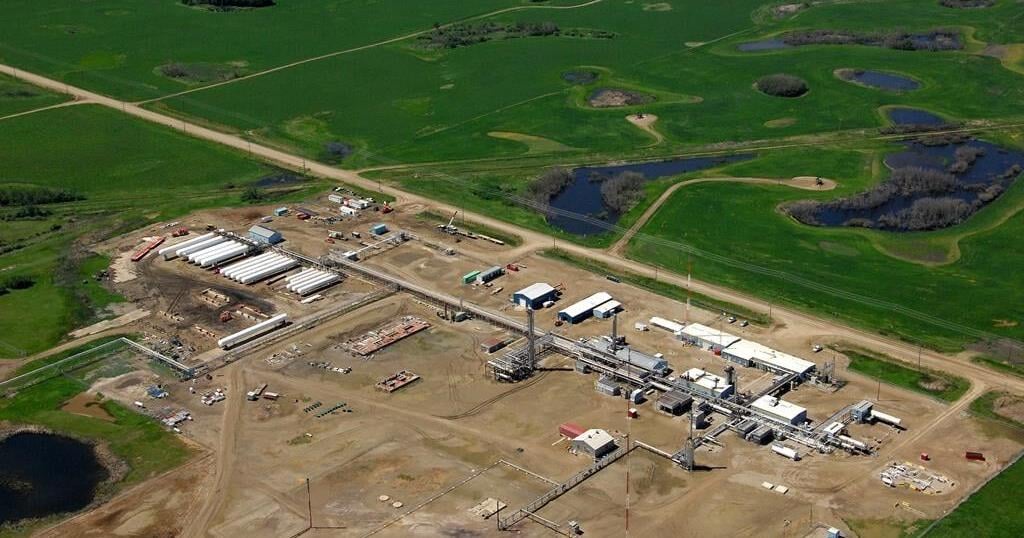As pressure grows on the oil and gas sector to reduce its emissions, one Calgary-based company is banking on the potential to convert waste gas from oil wells into valuable electricity for nearby communities.
The privately held Steel Reef Infrastructure Corp. — which owns and operates a network of crude oil and natural gas pipelines as well as processing and storage facilities in Saskatchewan and North Dakota — wants to become known as an industry leader in the relatively new space of flare gas recovery.
The company announced this week it has signed a series of power purchase agreements with Crown corporation SaskPower that will see it provide the utility with approximately 100 megawatts of electricity per year for Saskatchewan’s grid — enough to power 100,000 homes annually.
The electricity, expected to come onto the province’s grid by late 2027, will be produced at five of Steel Reef’s gas plants in Saskatchewan, using recovered gas that would otherwise be flared into the atmosphere at well sites.
“When we got into this, flare gas was an issue and it continues to be an issue,” said Steel Reef CEO Scott Southward in an interview.
“To me it’s inefficient. If you’re flaring … you’re missing out on an opportunity, right? That’s a valuable product that can’t be used.”
Flaring refers to the practice of burning off the excess natural gas associated with oil production.
Natural gas is a byproduct that comes to the surface when companies drill oil wells. If the volumes of gas are small, and there are no pipelines nearby to transport the gas, companies often choose, for economic reasons, to dispose of it through flaring.
Since 2012, Steel Reef has helped its oil-drilling customers by capturing this excess gas for them and then transporting it by pipe to its processing facilities where it can be made into useful products like propane and butane.
But its foray into the electricity space is new. Southward said in an interview that the company plans to invest $265 million to install new turbines and electrical substations at five of its Saskatchewan locations to convert the gas into electricity. The power produced at the sites will be “carbon efficient” in that it will put flare gas, a waste product, to productive use at a time when electricity demand is growing.
“The demand for electricity is really growing, so we feel this is a good first step for us to become the market leader in the flare-gas-to-power space that’s emerging right now,” he said.
“Flaring is wasting possible energy when, as a society, we’re crying out for more energy.”
Steel Reef’s announcement also comes at a time when the practice of flaring is increasingly under environmental scrutiny. The combustion process involved in flaring releases a variety of byproducts and greenhouse gases into the atmosphere, including carbon dioxide, according to oil and gas data provider Enverus.
The World Bank calls the practice of flaring “wasteful and polluting” and has identified the need to reduce flaring volumes globally as an urgent problem. It has also pointed to recent scientific studies that suggest more methane may escape into the atmosphere during the flaring process than previously assumed, suggesting the greenhouse gas impact from flaring could be underestimated.
In Canada, the federal government’s updated draft methane regulations — which aim to reduce oil and gas methane emissions by at least 75 per cent from 2012 levels by 2030 — say any flaring not being conducted for safety reasons will need to be supported by an engineering study that demonstrates a lack of other alternatives.
Amanda Bryant, senior oil and gas analyst with clean energy think-tank The Pembina Institute, said the sort of investments Steel Reef is making are exactly what will be increasingly needed in the years to come.
“Capturing waste gas that arises from oil and gas production that would otherwise be vented or flared and instead putting it to productive use is a good thing,” Bryant said in an interview.
“I would say that solutions like this are and will be increasingly important.”
This report by The Canadian Press was first published Oct. 4, 2024.
